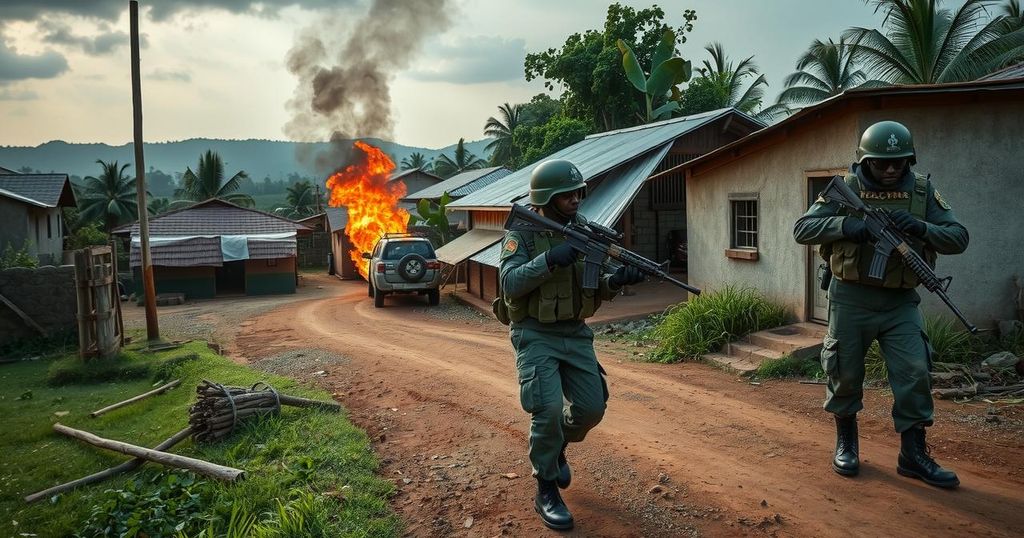Rwanda-backed M23 rebels have seized the town of Masisi in DRC, marking their second territorial gain in two days in North Kivu province. This escalation contributes to an ongoing humanitarian crisis, with calls for enhanced military support to the region. The situation is compounded by the breakdown of mediation talks between DRC’s President Tshisekedi and Rwanda’s President Kagame, alongside allegations of Rwanda exploiting the conflict for access to DRC’s mineral wealth.
Reports indicate that Rwandan-backed rebels have taken control of the town of Masisi in the Democratic Republic of Congo (DRC), marking the second town seized by the M23 group within two days in the mineral-rich North Kivu province. Since 2021, the M23 has progressively expanded its territorial control in eastern DRC, resulting in the displacement of hundreds of thousands of individuals from their residences. The Angolan government has sought to mediate discussions between DRC President Félix Tshisekedi and Rwanda’s President Paul Kagame; however, these negotiations collapsed last month.
Alexis Bahunga, a member of the North Kivu provincial assembly, expressed profound concerns regarding the captivity of Masisi, stating it “plunges the territory into a serious humanitarian crisis.” He urged the DRC government to bolster the military’s capacity in the affected region. Residents reported that the M23 had convened a meeting for locals, asserting their objective was to “liberate the country.” The local government has yet to provide an official response regarding the loss of the town.
Masisi, with a population of approximately 40,000, serves as the capital of its namesake territory and lies about 80 kilometers north of Goma, the North Kivu provincial capital, which the M23 briefly captured in 2012. The capture of Katale, a nearby town, occurred just a day prior. Despite concerns last year that the M23 might advance towards Goma, fighting subsided until early December, when clashes reignited.
In July, Rwanda acknowledged a United Nations report indicating that around 4,000 Rwandan soldiers were operating alongside the M23 within DRC. Rwanda accused the Congolese government of inadequate efforts to address the longstanding conflicts afflicting eastern DRC. Additionally, Rwanda has asserted that officials in DRC are collaborating with individuals implicated in the 1994 Rwandan genocide targeting ethnic Tutsis and moderate Hutus.
The M23 emerged from a previous rebel group in 2012, advocating for the Tutsi population in eastern DRC, which has experienced historical persecution and discrimination. Conversely, critics allege that Rwanda exploits the M23 for the plunder of eastern DRC’s valuable minerals, such as gold and cobalt, essential for manufacturing mobile phones and electric car batteries. Recently, DRC announced legal action against Apple regarding the extraction of “blood minerals,” to which Apple responded by stating it had ceased obtaining supplies from the country.
The situation in eastern Democratic Republic of Congo is a complex and ongoing conflict characterized by the involvement of various armed groups, including the M23, a rebel faction formed originally to protect the Tutsi minority. This region is rich in valuable minerals, which have been a catalyst for both local conflicts and international tensions. Rwanda’s involvement, viewed by many as an extension of its territorial and resource ambitions, has complicated the dynamics of the conflict and led to significant humanitarian crises, including mass displacements of civilians. The political landscape remains volatile, with various efforts, such as those initiated by Angola, aimed at restoring peace through dialogue. However, the resurgence of violence and territorial gains by rebel factions have stalled progress towards stability.
The recent capture of Masisi by Rwanda-backed rebels signifies a troubling escalation in conflict in the eastern Democratic Republic of Congo, emphasizing the persistent instability and humanitarian crisis in the region. The M23’s territorial advances highlight the ongoing struggles faced by the Congolese government and the complexities of regional politics involving Rwanda. As the situation develops, it remains crucial for international and regional stakeholders to seek comprehensive solutions to restore peace and address the humanitarian needs of affected populations.
Original Source: www.bbc.com






